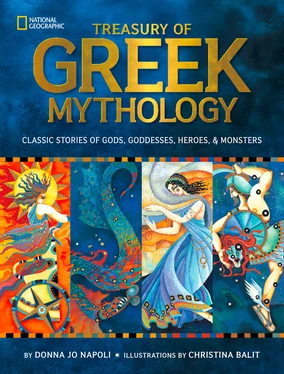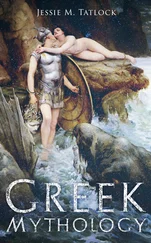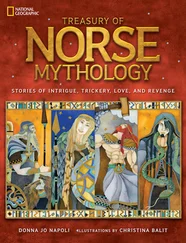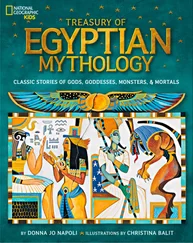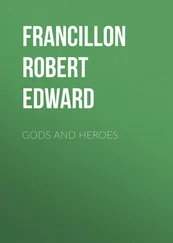Christina Balit - Treasury of Greek Mythology - Classic Stories of Gods, Goddesses, Heroes & Monsters
Здесь есть возможность читать онлайн «Christina Balit - Treasury of Greek Mythology - Classic Stories of Gods, Goddesses, Heroes & Monsters» — ознакомительный отрывок электронной книги совершенно бесплатно, а после прочтения отрывка купить полную версию. В некоторых случаях можно слушать аудио, скачать через торрент в формате fb2 и присутствует краткое содержание. Жанр: unrecognised, на английском языке. Описание произведения, (предисловие) а так же отзывы посетителей доступны на портале библиотеки ЛибКат.
- Название:Treasury of Greek Mythology: Classic Stories of Gods, Goddesses, Heroes & Monsters
- Автор:
- Жанр:
- Год:неизвестен
- ISBN:нет данных
- Рейтинг книги:3 / 5. Голосов: 1
-
Избранное:Добавить в избранное
- Отзывы:
-
Ваша оценка:
- 60
- 1
- 2
- 3
- 4
- 5
Treasury of Greek Mythology: Classic Stories of Gods, Goddesses, Heroes & Monsters: краткое содержание, описание и аннотация
Предлагаем к чтению аннотацию, описание, краткое содержание или предисловие (зависит от того, что написал сам автор книги «Treasury of Greek Mythology: Classic Stories of Gods, Goddesses, Heroes & Monsters»). Если вы не нашли необходимую информацию о книге — напишите в комментариях, мы постараемся отыскать её.
Treasury of Greek Mythology: Classic Stories of Gods, Goddesses, Heroes & Monsters — читать онлайн ознакомительный отрывок
Ниже представлен текст книги, разбитый по страницам. Система сохранения места последней прочитанной страницы, позволяет с удобством читать онлайн бесплатно книгу «Treasury of Greek Mythology: Classic Stories of Gods, Goddesses, Heroes & Monsters», без необходимости каждый раз заново искать на чём Вы остановились. Поставьте закладку, и сможете в любой момент перейти на страницу, на которой закончили чтение.
Интервал:
Закладка:
Then his Titan sister Rhea caught his eye. She was too lovely to resist. So he took her as his wife. But each time she gave birth— producing glorious children, the daughters Hestia and Demeter and Hera, the sons Hades and Poseidon—he panicked and swallowed them. Cannibal? No. No no. He told himself this was simply self-protection.
Rhea, like Gaia before her, felt herself drowning in grief. And, like Gaia before her, she finally reached the dreadful conclusion, the only conclusion: She must stop the brutality. When she recognized the first stirrings of a new baby within her, she asked her parents, Gaia and Uranus, for help. They shepherded her off to the island of Crete, where she gave birth in secrecy to her son Zeus.
Then she left her newborn son for her mother to raise, swaddled a stone, and hurried home to Cronus, who quickly seized the false babe and swallowed it. Wretched Cronus, completely duped, completely ignorant that his son Zeus lived, completely doomed.
Cronus’ fear of his children transformed his body into their prison—swallow, swallow, five times. But the sixth time he swallowed the swaddled stone and began his own demise.



Young Zeus clambered up the rocks behind a billy goat. He walked the mountain ridge and stopped on the highest peak of Crete to look out over the salt-white sea that stretched to Africa. He turned and there was Gaia, his grandmother, who had raised him.
“You’re strong enough,” she said. “It’s your turn.”
Zeus’ heartbeat raced. It filled his head. It filled his whole self. He needed no further information or encouragement. His father, Cronus, had swallowed his brothers and sisters at their births. Zeus had escaped only because his mother, Rhea, had fooled the fear-crazed man into swallowing a stone instead. The boy had grown strong, fearsome, clever. He now went quickly to meet his father for the first time. He was primed for this. Armed. This was the moment of defeat or victory, yet his nerves were steady. He felt strangely elated.
While Zeus journeyed, Gaia reached out to Cronus and crooned in rocking tones that penetrated in that deep way only a mother’s voice can. The suggestion was too powerful; Cronus doubled over. The stone and children within spewed forth from his mouth, landing at the feet of the newly arrived Zeus.
The five older children of Cronus—Hestia, Poseidon, Hades, Demeter, and Hera—aligned themselves with Zeus against their father. What else could they do? Zeus meant freedom, a delicious new idea.
But Cronus had brothers and sisters, too. He called the Titans to his side.
War began. And continued, as wars will do. For ten years the battle scorched the earth, smoked the skies, sullied the waters. Bitter as bile, it wore away at everyone’s spirits. Until Gaia, the earth mother who had started all life, told Zeus he would win if he liberated her other children—his misshapen uncles and his one-eyed uncles—that Cronus had cast into Tartarus, the Underworld.
WARS of Ancient Greece
Mythological wars might reflect stories about real prehistoric wars. The war between the Titans and Olympians lasted ten years, according to the ancient Greek poet Hesiod. Another great war, between Greece and Troy, also lasted ten years, according to the poet Homer. (Poets were often the historians of their age.) We have no information about actual wars from before or during the lives of these poets.
An ancient Greek soldier
Zeus never wasted a moment on second thoughts. He freed the three brothers with fifty heads and one hundred hands each. He freed the three Cyclopes. In surprised gratitude, the Cyclopes gave Zeus the spitting lightning bolt and deafening thunder with which to split the skies and flame the earth. They gave his brothers gifts, too. On Poseidon they bestowed a sharp, gleaming trident with which to smite the seabeds and raise massive waves. To Hades they gave a helmet of invisibility with which to disappear.
These hundred-handed and one-eyed brothers fought beside their nieces and nephews, all against the Titans. And the nephews let loose with their newly gained ferocity. No longer was the battle simply hurling rocks and spears, and crushing the enemy with axes. Oh, no. Zeus hurled bolts, burned the forests, and left them smoldering. He cast flames so hot the seas boiled and parts of the Earth melted. Poseidon shook the Earth so rivers crashed through their sidewalls. Hades raced unseen among all, stabbing, smashing, maiming.
As Zeus saw it, the war amounted to old against young, and the young gods won, as they had to. That is the nature of things. By the end of the war, both sets of gods fought from mountaintops—the Titans from Mount Othrys, the young gods from Mount Olympus. So after the war the young gods were known as the Olympians.
Zeus had the Titans sealed in Tartarus with the hundred-handed ones as guards. Gaia was flummoxed. What was the point of locking away the Titans? Why did Zeus have to be as vengeful as his father? And so she gave birth to her last child, the monster Typhon. From his shoulders sprang a hundred serpentine heads with flickering black tongues uttering every noise imaginable—human, bestial, thunderous. Typhon’s eyes flashed fire. Everyone fell back in terror. Except Zeus. He had lightning, a force unsurpassed. He burned off Typhon’s heads and banished him to become wild winds that cursed sailors on the high seas. Zeus was the undisputed king.
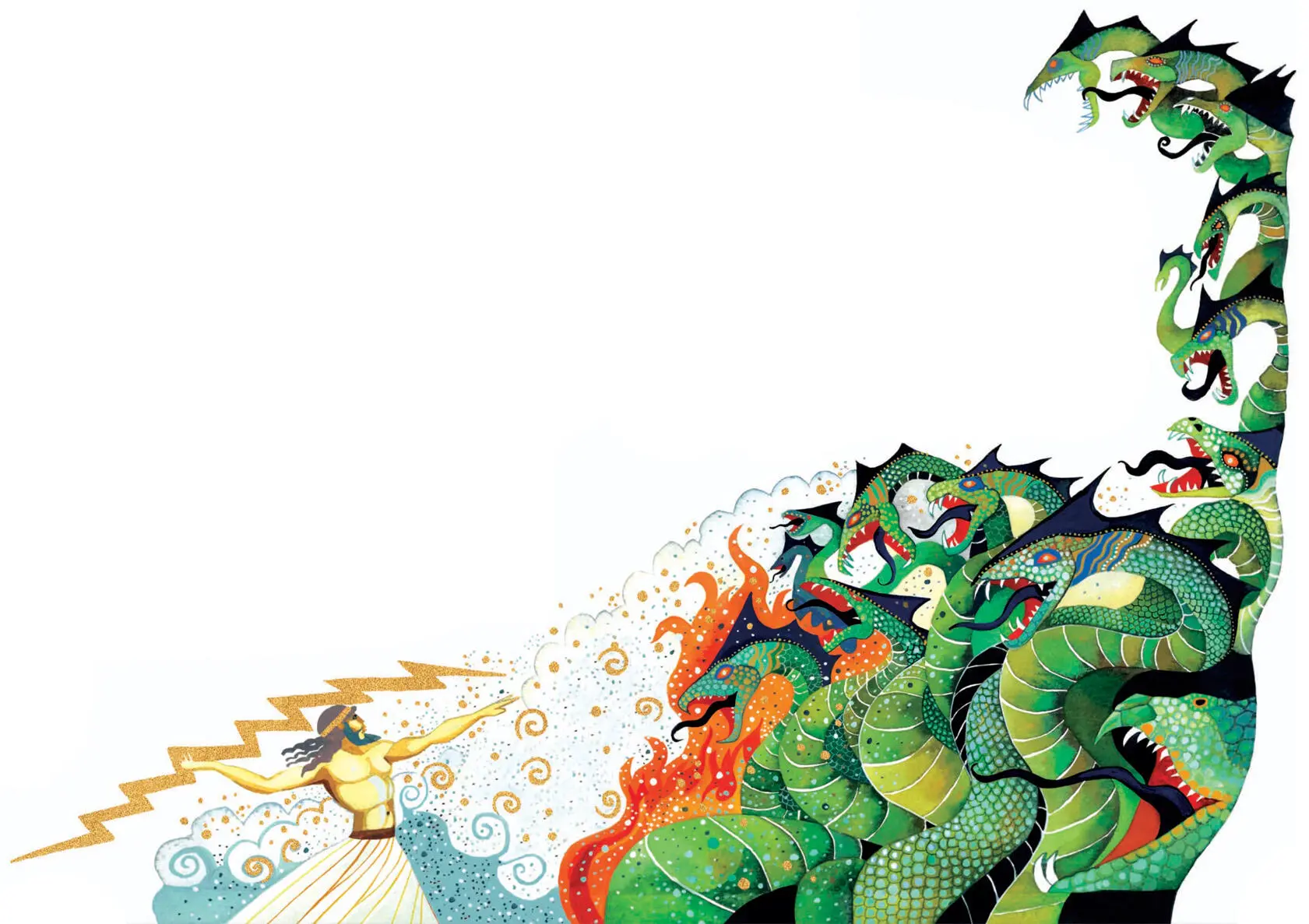
Gaia gave birth to the monster Typhon, hoping he could stand up to his bully brother Zeus. But the weapon of the thunderbolt allowed Zeus to conquer Typhon’s hundred heads.
The Olympian brothers divided up rulership of the universe. Poseidon took the seas; Hades, the Underworld; Zeus, everything else. The division wasn’t equal, and the Olympian sisters were left out entirely. But that was typical of Zeus. He was brought up to believe he was entitled. Nothing ever changed his mind.


Hestia’s first memory was of blackness. And stifling heat. Then something tumbled in beside her, all wiggly. And another wiggly something. And two more. And, finally, a giant lump. She was crowded, poked and prodded, cramped. And so breathlessly, unrelentingly hot. She didn’t know she was trapped in her father Cronus’ belly. She didn’t know the wiggly somethings around her were her sisters Demeter and then Hera, and her brothers Hades and then Poseidon. She didn’t know the lump was a stone her father had been duped into swallowing in place of his sixth child. She knew only great discomfort and an undefined lack that gnawed at her spirit. Something was supposed to be happening. Someone was supposed to be there. Somehow everything was wrong, everything hurt. A vague fear lodged in her heart.
Читать дальшеИнтервал:
Закладка:
Похожие книги на «Treasury of Greek Mythology: Classic Stories of Gods, Goddesses, Heroes & Monsters»
Представляем Вашему вниманию похожие книги на «Treasury of Greek Mythology: Classic Stories of Gods, Goddesses, Heroes & Monsters» списком для выбора. Мы отобрали схожую по названию и смыслу литературу в надежде предоставить читателям больше вариантов отыскать новые, интересные, ещё непрочитанные произведения.
Обсуждение, отзывы о книге «Treasury of Greek Mythology: Classic Stories of Gods, Goddesses, Heroes & Monsters» и просто собственные мнения читателей. Оставьте ваши комментарии, напишите, что Вы думаете о произведении, его смысле или главных героях. Укажите что конкретно понравилось, а что нет, и почему Вы так считаете.
